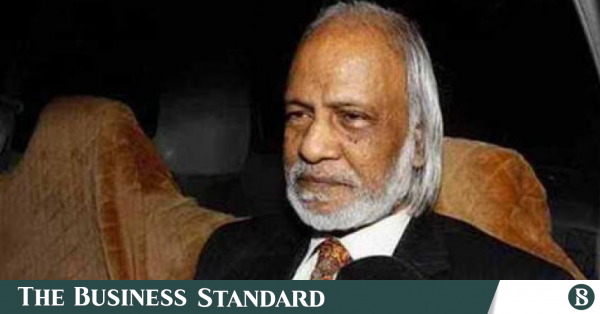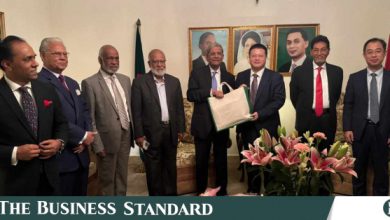India blundered by putting all eggs in one (Hasina) basket, needs to shift policy: BNP


Underlining that India’s foreign policy mandarins in South Block made a “massive policy blunder” and a “political blunder” by deciding to put “all its eggs in one basket”, top BNP leader and former Cabinet minister Abdul Moyeen Khan has said there is “immediate need” for India to have a “renewed look” at its Bangladesh policy in this “hour of crisis” following the ouster of Prime Minister Sheikh Hasina.
In an interview to The Indian Express at his residence in Dhaka’s Gulshan neighbourhood, 77-year-old Khan said, “We believe in friendship with India. India is on our three sides of the borders. India is with us, day in and day out. Why would we not want to have a good relationship with India? Now there has to be a policy shift in India. We hope the Indian government, both political and foreign office, will calibrate foreign policy and politics… There is an immediate need to have a renewed look of Bangladesh from India’s security and the strategic establishments as well.”
He said, “Bangladesh is not pro-Pakistan. We will never be pro-Pakistan.”
Khan said he will be “surprised if any formal request is made to the Indian government” for Hasina’s extradition since “an extradition treaty may not be applicable in case of political asylum seekers” though Delhi has not yet made clear on what basis has she been accommodated in India.
Exerpts from the interview:
What went wrong with Sheikh Hasina?
Sheikh Hasina had captured the civil administration, police, RAB, Election Commission, the anti-corruption commission, judiciary as well as the media, to name a few institutions.
There was a saying in Bangladesh that mega projects meant mega corruption. She converted the republic into an oligarchy.
On Hasina extradition possibility:
I would like to highlight that the political standing of our former Prime Minister, Sheikh Hasina, who is now in India, is extremely fluid.
As you are well aware, an extradition treaty may not be applicable in case of political asylum seekers.
In addition, the government of India has not yet made its position clear on how and on what basis our former Prime Minister, who fled from Bangladesh, has been accommodated in India under these circumstances. I would be surprised if any formal request is made to the Indian government (a Reuters report quoted Touhid Hossain, the interim government’s foreign affairs advisor saying Hasina is facing “many cases” and if the country’s home and law ministries decide, “we have to ask for her… return to Bangladesh”).
However, it is quite clear that the advisor has already spoken to the Indian High Commissioner in Dhaka regarding the untoward statements being made by our former Prime Minister, who has fled to India, and he categorically mentioned that if such announcements coming from a foreign soil continues, this may affect the relationships between the two countries.
So it’s not really the question of extradition. The circumstances under which Sheikh Hasina fled from Bangladesh is clear, not only to Bangladesh people, but also to the people and the government in India and to the rest of the world. It is obvious that she is trying to find a place where she can stay. To the best of my knowledge, the United Kingdom and the United States have refused to take her. There was a rumour that she might flee to Finland, and that option is also possibly out of question.
In this circumstance, it is obvious to the people of Bangladesh that she is probably going to stay for the time being in India. It’s now up to the Indian authorities, the policy makers, the politicians and their foreign ministry to appreciate the circumstances under which she had to leave the country, and whether patronising her and allowing her to make statements which go against the people of Bangladesh would be helpful for the friendly relations between India and Bangladesh.
On the students’ movement:
The students’ movement started with the discrimination in jobs, by demanding the removal of quotas… That was the first phase.
So, when Sheikh Hasina called them Razakars, it was the biggest insult for people of Bangladesh, for the protesters in Bangladesh. The Razakar numbers were very, very small even in 1971, they were less than 1 per cent, maybe 0.001 per cent. So, identifying the protesters as Razakars was one of Hasina’s biggest mistakes.
The next phase came after the police atrocities in the first round in mid-July, when they started demanding for the resignation of the Home Minister, Information Minister, IT Minister and the Vice Chancellors of universities who were trying to block them from protesting. The Vice Chancellors had called the police to campus.
And the third and the last phase was when the detective branch of Bangladesh – they are equivalent to the US Secret Service – took about six student coordinators from the movement, and forced them to sign a document saying that they withdraw the agitation and they agree to the demands. But that was obviously not accepted by the remaining coordinators. That was the tipping point… And then the police atrocities and the killings before August 5 was the final nail in the coffin.
On the new elements in the protests:
Many children of Army officers were on the streets who identified themselves with the common cause of the students, and that alienated a large section of the Army. Their wives also reportedly told them to protect the students, and not fire at them.
So this was a sudden spark that sort of burned the house. It was like a flash flood that washed away all injustice, persecution and intimidation accumulated over a decade and a half. It was unprecedented, as if people are able to breathe fresh air, coming out of suffocation.
The Internet was the gun of the young people. This was their weapon against the guns of Hasina’s police forces.
On BNP’s role in the students’ protest:
As a party, BNP lent its moral support. And students did not want to associate with the political parties either. We have given overall support to the cause of the students. Maybe 80-90 per cent of students on the streets were from the BNP, but they are not there as BNP activists, rather as students.
Also read | Sheikh Hasina seeks justice, calls for mourning on day father was killed
On the vandalisation of PM residence:
This was an outburst of frustration. People collected stuff as souvenirs. It was an outburst of emotions. Everyone felt totally suffocated during the Hasina regime, so this was a breath of fresh air.
On the demolition of Mujib’s statues
When I saw Sheikh Mujib’s statues being brought down, I remembered Saddam Hussain’s statues being brought down in Iraq.
This was because of Hasina’s vengeance and arrogance. She damaged herself. She damaged the legacy of her father, and she damaged her own party.
She took away the power from the politicians in her party and operated through bureaucrats and police, judiciary and her state machinery. She started believing in her own propaganda which eventually destroyed her.
If you really ask me, in fact, there was no grief on August 15, 1975 (after Sheikh Mujib was assassinated). Similarly, there was no grief on August 5 (after Hasina quit and left the country). There was rejoicing on the streets of Dhaka by hundreds of thousands of students and common people and the same was the picture all over the country.
Bengalis are anti-establishment by nature. So, they constantly want change and that has been the pattern since regular and free and fair elections were taking place in this country.
On BNP’s alliance with Jamaat-e-Islami:
There are around 50 seats, where there is a 5-10 per cent difference between BNP and the Awami League. So, BNP’s alliance with Jamaat-e-Islami was an arithmetical alliance. Awami League had also allied with the Jamaat before the 1996 general elections, perhaps for electoral advantage as well.
On Jamaat-e-Islami’s influence:
Honestly, Jamaat is apparently a paper tiger… Jamaat is not really a force that has a place in the minds of common Bangladeshis and does not at all have the capacity of a terror force as may be perceived by India. Outsiders generally overestimate its influence.
Bangladeshi people, some may be religious-minded, but if someone accuses us as zealots, they will be utterly wrong. This is particularly important because this is what the political establishment in Delhi, as well the Delhi policy-makers, need to comprehend.
Bangladesh does not comprise orthodox religious people… The outside perception of Jamaat is not commensurate with the internal perception of Jamaat.
As I said, BNP and Jamaat had an arithmetic relationship in 2001. In the BNP government, there were two Jamaatis, but Hasina indeed had one of the identified Razakars in her 1996 government.
In 2006, she tried to paint BNP-Jamaat as a combination on the issue of Hindus being attacked, totally with a political motive.
On the recent attacks against Hindus:
This time also, there is no religious hatred. Allegations are, some have used the religion wrongly for political killings of hardly 4 or 5, if at all. No concrete evidence has been placed yet by those who brought such allegations. I would welcome that you yourself go and investigate. Unlike during the AL rogue regime, it is now an absolutely free society. Last one week has been tumultuous.
The allegations of the 4-5 killed in a country of 170 million people, and even if they were killed, one is not sure if that could have been for social, family and other personal reasons to settle scores. The question of allegations of Hindu persecution, intimidation or killings as a religious vendetta in Bangladesh doesn’t even arise in the last 10 days.
I don’t also deny there might be some truth to it, but you can’t hide deaths in this modern age. It is true emotions are running high. This could have happened to some Awami League leaders because of political hatred. But this is a highly exaggerated narrative and totally hypothetical that Bangladesh is being destroyed by fundamentalist forces.
On India’s position on Bangladesh:
India’s foreign policy mandarins in South Block have committed a massive blunder. They promoted and sustained a friendship between the two governments and not between the two peoples. It’s a policy blunder. The Indian government mistakenly decided to put all its eggs in one basket.
Moreover, it’s also a political blunder. Nobody would deny the help and support Bangladesh got from India in 1971. Nobody can deny that during the 1971 War of Liberation, without the support of India, we couldn’t have got independence in a short span of 9 months. Without that support, it would have been a long-drawn struggle.
But, for India to assume and ascribe the success to one political party, that it is the Awami League, has been a bad mistake. The success must be attributed to the people of Bangladesh at large.
The Awami League under Hasina tried to paint the struggle as him (Sheikh Mujib) versus others. This is a wrong perception. Each and every Bangladeshi was in favour of independence, except for a very, very small handful of people.
We believe in friendship with India. India is on our three sides of the borders. India is with us, day in and day out. Why would we not want to have a good relationship with India? Now there has to be a policy shift in India. We hope the Indian government, both political and foreign office, will calibrate foreign policy and politics. There’s a need for a renewed look at India’s Bangladesh policy in this hour of crisis. There is an immediate need to have a renewed look of Bangladesh from India’s security and the strategic establishments as well.
As we hear, Modi hasn’t yet met Hasina, and I am sure Hasina would have had a shock of her life but that is politics.
Bangladesh is not pro-Pakistan. We will never be pro-Pakistan but only have a normal relationship as with any other country. Hasina played the China card for money, obviously for chequebook diplomacy.
On the Yunus-led interim government:
The interim government, they are trying to consolidate their grip on the administration. In the last few days, they have changed several officials who were operating during the previous regime, they have arrested Salman Rahman and Anisul Haq, they have cancelled the August 15 national holiday as there was a threat of a counter coup as rumoured, so they are taking steps to counter that.
We want the interim government to initiate the transformation from an autocratic rule to a democratic government. And reform is a continuous process. Reforming the police is not easy. If the BNP forms a government, we want the same reforms, so it can’t be achieved in a few days or weeks.
It is wrong to presume that we first reform and then hold the elections, it has to be a parallel process.
If they are wise, they should wash their hands of at the earliest as soon as their task is completed. So the interim government is here out of a “doctrine of necessity”.
On the Army’s role:
The Bangladesh Army has a dominant role. The Army has usually been a dominant force in Bangladesh although India is a very different case, but other South Asian examples are similar. This is apparently an Army-backed government while the student-people alliance is still playing as the dominant pressure group.
I am absolutely amazed how Yunus is asserting his independence. He has the confidence, he has the aura to tell the Army to back off as needed.
On the return of BNP chief Khaleda Zia’s son Tarique:
It is not yet clear when Tarique Rehman will come back. The conviction in cases also needs to be remedied.




